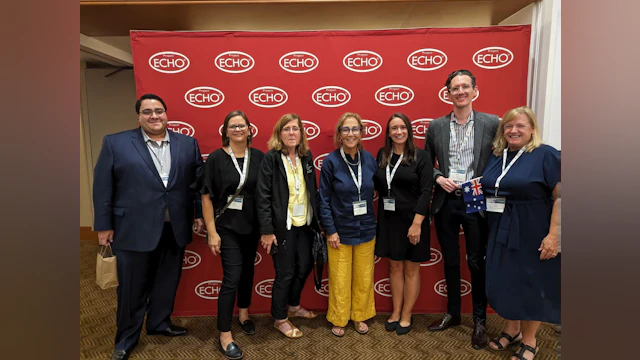It’s often said that children are the future, but as someone working in the field of suicide prevention, I see children and teens making a difference today. They’re having open and honest conversations about mental health, they’re supporting their friends and loved ones, and they’re fighting for a better future. To help ensure that future, our job is to equip educators, health care providers, and all those who interact with youth with the knowledge to handle suicide risk effectively, and to empower them with the tools and resources to save lives.
After losing a patient to suicide in early 2023, Edward Salzberg, MD FAAP, a pediatrician at Roswell Pediatrics Center in Georgia, was looking for solutions.
“I had a teenager who died by suicide within 30 minutes of leaving their wellness visit. After that, I thought to myself, ‘How can we do better?’. Until it happens to you, until you have a really close encounter, you may not know what to do.”
In my job at the American Foundation for Suicide Prevention (AFSP), I collaborate with our staff, volunteers, and partners to measure the impact of our work and ensure we’re meeting the needs of the communities we serve. In that work, I get to talk to people across the country to hear their stories and learn from their experiences. In my conversation with Dr. Salzberg, I was struck both by his determination to do more, and by the enormous toll similar stories must take on pediatric health providers across the country. Pediatricians are increasingly encountering patients with suicide risk and are in need of evidence-based strategies to support them. To help meet this need, AFSP and the American Academy of Pediatrics (AAP) have joined forces to save lives and support pediatric health providers in advancing equitable youth suicide prevention in all settings where youth live, learn, work, and spend time.
Our partnership with AAP began in 2021 and focuses on a series of programs designed to engage pediatricians, pediatric health providers, and community members to integrate the use of the Blueprint for Youth Suicide Prevention in clinical and community settings. These Project ECHO (Extension for Community Healthcare Outcomes) programs engage pediatric health providers on the best practices for suicide prevention by utilizing a tele-mentoring model, leveraging our faculty expertise, and measuring clinical outcomes to create change. For example, participants learn how to do suicide risk screening — a quick way to identify someone who needs further evaluation and support.
“It was enlightening. I wasn’t aware there were standard screenings that could be used. I didn’t realize there we so many resources available. It was so compelling,” said Dr. Salzberg.
With funding from AFSP, The Pew Charitable Trusts, and CVS Aetna, we launched our first Project ECHO cohort in January of 2023, reaching over 40 pediatric health clinicians from urban, suburban, and rural communities across 11 states. In the time since, our clinical and community ECHO programs have reached hundreds of providers and community members across over 40 states.
“There was definitely a sense of community — an instant connection with people. They asked, ‘how are you doing?’, and I honestly hadn’t even thought about it — how I was doing after losing a patient. The resources for providers who lose a patient were also so helpful.”
Other participants shared Dr. Salzberg’s sentiments, expressing the relevance and applicability of the content. As another pediatrician said, “It was very relevant to what pediatricians are experiencing.” Another echoed this sentiment: “There were actual concrete suggestions as to how to implement suicide prevention in primary care.” For example, for a patient who has screened positive for suicide risk, participants learned how to conduct a safety assessment and identify next steps for care. In our surveys, we found that 85% of participants reported they had increased their knowledge about suicide prevention (including risk factors and warning signs for suicide); 77% reported increased confidence in their ability to apply the information presented; and nearly all participants (93%) said they were committed to implementing the skills they learned in practice.
Even beyond the impressive data and the implementation strategies, stories like Dr. Salzberg’s remind me of the value of partnership and the importance of our work in health care systems. In the months since his Project ECHO cohort concluded, Dr. Salzberg has continued to apply the valuable skills he learned, including training staff on best practices and providing resources to families.
“We’re at the beginning stages of implementing, and there are three projects: We’re creating a list of reliable resources for patients and families, we’re training our staff on how to screen patients for suicide risk, and we’re looking into how we can incorporate these processes into our daily visits. We can’t create a perfect system right away, but we can try.”
At AFSP, our work is about saving lives and bringing hope to those affected by suicide. Part of that work means elevating mental health to the same importance as physical health, and working with health care systems to make that goal a reality. Dr. Salzberg sums up this point well:
“We’re always prepared for the asthma attack or seizure or a kid who isn’t breathing. Now we have a mechanism for assessing suicide risk and feel more confident managing these critical encounters.”
To learn more about Project ECHO and upcoming opportunities to participate, contact [email protected]. Learn more about the Blueprint for Youth Suicide Prevention at aap.org/suicideprevention.
